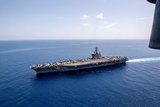Russia's new maritime doctrine big on naval rivalry, short on realism
Russia has aspirations to build new aircraft carriers but is already struggling to maintain larger surface combatants such as the cruiser Admiral Nakhimov. (Photo: Oleg Kuleshov)
On 31 July Russia adopted a new Maritime Doctrine, replacing the previous iteration enacted in 2015. The new version has some important changes, especially in its military and security articles.
While the majority of the document is still dedicated to civilian issues such as development of the commercial fleet or climate change, the doctrine is noticeably more ideological, closer to Soviet concepts and oriented towards rivalry with the US and military aspirations.
For example, the US is mentioned only once in the 2015 doctrine, and not as a rival, but as trade partner. In the new version there is special article on threats which was absent before,
Already have an account? Log in
Want to keep reading this article?
More from Defence Notes
-
![Why small guns have been critical to layered CUAS architectures]()
Why small guns have been critical to layered CUAS architectures
Multiple countries have been deploying small arms as the last line of drone defence due to their multiple operational and tactical advantages.
-
![Singapore Airshow 2026: ST Engineering hints at export success for AME assault rifle family]()
Singapore Airshow 2026: ST Engineering hints at export success for AME assault rifle family
The Singapore-based technology company unveiled its new rifle family at this week’s airshow. Chen Chuanren spoke with the ST Engineering’s head of small arms to find out more about how the weapons have been refined.
-
![High tension in the High North – a wake-up call for NATO’s future Arctic defence efforts?]()
High tension in the High North – a wake-up call for NATO’s future Arctic defence efforts?
Any potential ‘Arctic Sentry’ mission would be months in the planning, but with tensions high in the region given the US’s push for Greenland, NATO countries will need to continue to emphasise their commitment to the region, analysts have said.
-
![Venezuela prepares personnel and equipment for a potential second US attack]()
Venezuela prepares personnel and equipment for a potential second US attack
Defence Minister Gen Vladimir Padrino López has declared that the Venezuelan armed forces “will continue to employ all its available capabilities for military defence”.
-
![As the new year starts, the UK defence spending delay continues]()
As the new year starts, the UK defence spending delay continues
The UK’s defence spending commitments remain uncertain as the government’s Defence Investment Plan, which had been due by the end of 2025, is yet to be published.

























